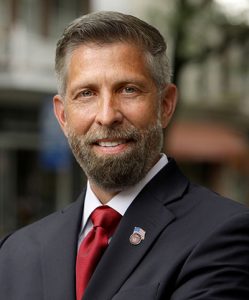For Craig Williams, running for state representative is just an extension of his decades-long desire to serve. He retired as a full colonel from the Marine Corps after 28 years, having served as a weapons officer on F-18s during the Gulf War, and attended law school at the University of Florida while still in the Marines.
After retiring, he became a federal prosecutor with the Department of Justice, prosecuting a host of crimes, including illegal gun possession, drug distribution conspiracies, and fraud. He was a prosecutor for the Joint Terrorism Task Force. Locally, he's been a Boy Scout leader and a football and baseball coach.
"I've spent my entire adult life in service to my country and my community, and that's what this is for me. I'm not stepping forward to be a state representative because there's fame and fortune that follows with it. It's part of the essence that is me," he said.
A Republican, Williams, 55, is running against Democrat Anton Andrew to represent the 160th Legislative District. Steve Barrar currently holds that office but is retiring at the end of this session.

Williams has several top tier issues. One is school funding. He referred to himself as an advocate for spending more money on education. Still, he said the state needs to change the apportioning formula that allows school district budgets to remain constant even if the population drops.
He said a school district with a diminishing school population should have its state funding cut, that the dollars allocated to a district should be based on the number of students in that district. "Funding should be proportional to the population," Williams said.
And, as others before him have said, he wants to stop using property taxes to pay for schools.
"I hope that we can get away from that formula. I've knocked on countless doors of seniors who say that's their number one issue. As you can imagine, being on a fixed income, even with the house being paid off, based on the value of their home they still have a $10,000 to $12,000 tax bill. I have one senior who calls me every month to make sure I remember that's her number one issue," he said. "She's worried that she's going to lose her home because she can't bear that expense."
He's hoping to change funding education from property taxes to extractions taxes.
"I'm not proposing the entirety of the extraction tax to go to education because there's a bit of dependency. You don't want to draw on the extraction of shale gas because when that natural resource starts to dry up over time, you don't want to end up with an education void down the line."
He understands the property rights issue but also sees those natural resources belong to the people. He specifically mentioned how Alaska — where he's from originally — treats its natural gas reserves as belonging to the residents, so there is no state income tax.
"And I feel that way about Marcellus Shale," he said, adding that "This isn't a popular Republican opinion, but I think we should all benefit from the exploration of that resource."
Williams also wants to see reduced costs for health insurance premiums. He said one way to do that — in addition to using some of the extraction tax for that purpose — is "to start being transparent about those costs" so patients can see an itemized breakdown of all the costs involved. With that breakdown, he said, people would see exactly what they're paying for, and that, in turn, would bring pressure to lower the cost of insurance and healthcare.
He then drew an analogy. "If someone repairs my water heater and they give me an $800 bill for the repair, and I don't get to see all the itemized costs, I won't know if I paid fair market value for that. What I want is for the patients to see what all those costs are. That will lead to a natural downward pressure from the transparency that will translate to cheaper healthcare costs."
Other issues
The war on drugs
Williams has an emotional reaction to the drug war, especially regarding what's been called the opioid epidemic. He said many people have been unaware of how addicting some of today's drugs — pharmaceutical and black market — can be. But he added that addiction should not be treated as a crime. "One thing I know that does not work is incarceration."
He mentioned a criminal case when he was a federal prosecutor in Colorado where a woman had violated her parole three times by using methamphetamines…The only time she was ever clean was when she was in prison. But that wasn't the way to help her clean up her life."
Williams opened up during the interview, saying he lost a brother to addiction this summer.
"He struggled with it since high school, and that's part of the narrative for me about marijuana legalization because that's where it all started. His consumption of marijuana in high school was such that it completely derailed his schooling and career…This is an area where I'm particularly concerned."
And while he's uncomfortable with the possibility of adult use of cannabis being legalized in Pennsylvania, he wants to keep an open mind, despite seeing marijuana as a gateway drug based on what happened to his brother.
"All I can rely on now is my instinct and my personal experience, but I want to hold that conversation [about legalization] open for now."
He added that while he still opposes recreational use, he thinks legitimate medical uses go beyond what the state currently allows.
Criminal justice reform
Williams said he sees civil asset forfeiture as a violation of constitutionally guaranteed rights.
"That is a huge due process problem," he said. "I believe that asset forfeiture absolutely ought to be tied to criminal convictions." Even though the governments take in billions of dollars through civil asset forfeiture, "that doesn't justify taking somebody's property before they're convicted of a crime."
His view on qualified immunity is slightly different. He thinks police should have qualified immunity or, as he put it, "the protection of the Constitution." He explained that the immunity is qualified, not general, that police can be held liable if they break a law or knowingly violate the rights of another.
"There has to be a clear violation of the Constitution for them to be denied qualified immunity."
Williams is married, has four children, and lives in Concord Township.
About Rich Schwartzman
Rich Schwartzman has been reporting on events in the greater Chadds Ford area since September 2001 when he became the founding editor of The Chadds Ford Post. In April 2009 he became managing editor of ChaddsFordLive. He is also an award-winning photographer.


 (11 votes, average: 3.91 out of 5)
(11 votes, average: 3.91 out of 5)
Comments